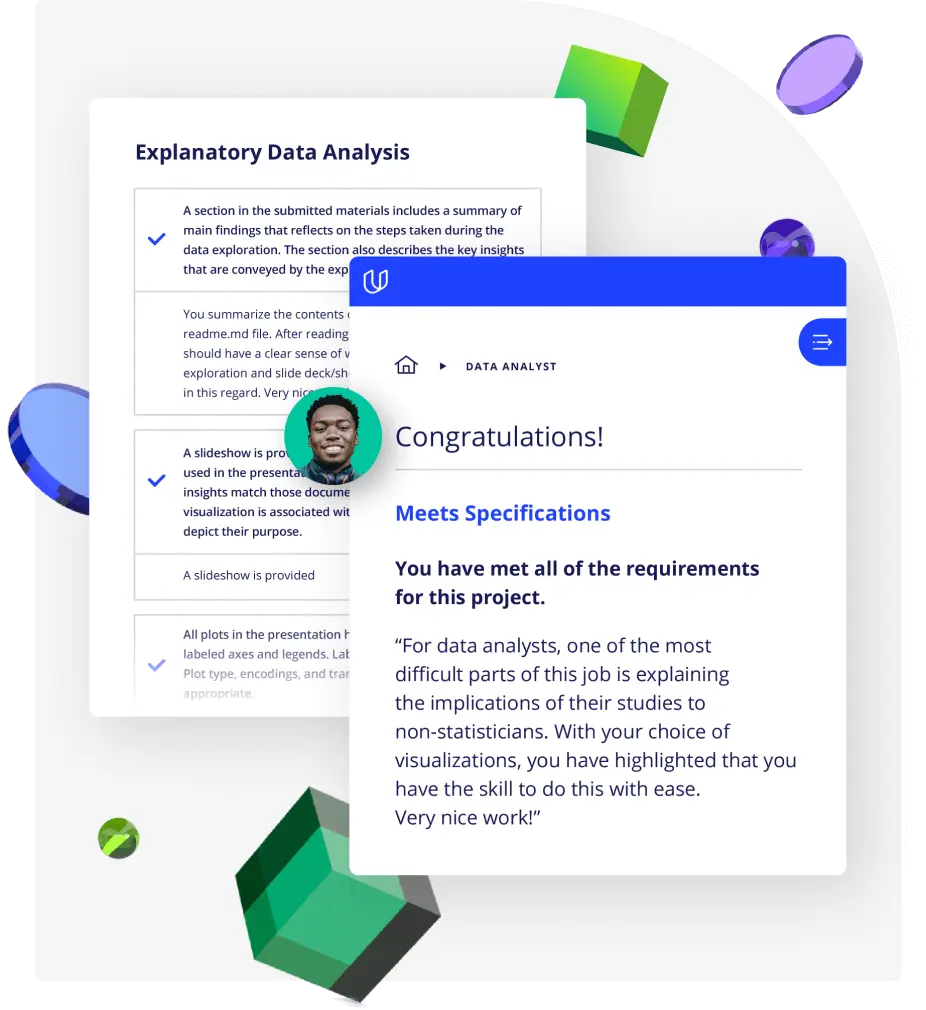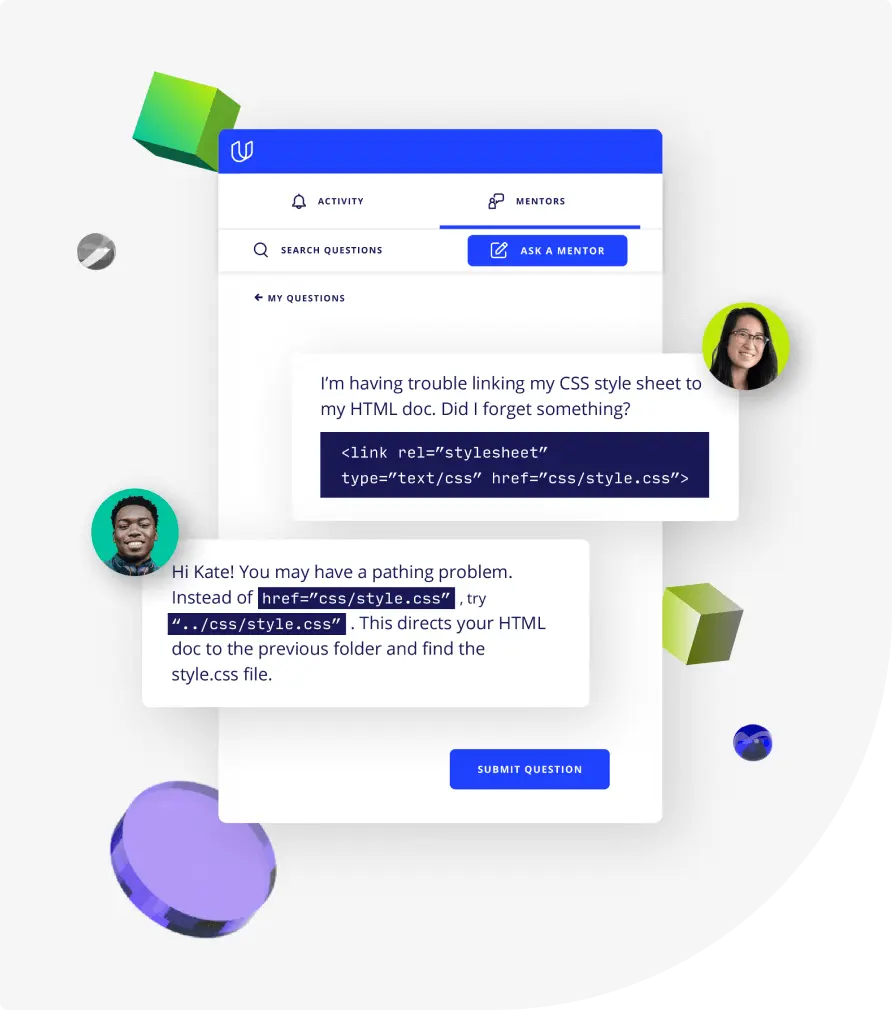Lesson 1
An Introduction to Machine Learning DevOps Engineer
Welcome! We're so glad you're here. Join us in learning a bit more about what to expect and ways to succeed.

Nanodegree Program
The Machine Learning DevOps Engineer Nanodegree program focuses on the software engineering fundamentals required to successfully streamline the deployment of data and machine-learning models in a production-level environment. Students will build the DevOps skills required to automate the various aspects and stages of machine learning model building and monitoring over time.
The Machine Learning DevOps Engineer Nanodegree program focuses on the software engineering fundamentals required to successfully streamline the deployment of data and machine-learning models in a production-level environment. Students will build the DevOps skills required to automate the various aspects and stages of machine learning model building and monitoring over time.
Advanced
4 months
Real-world Projects
Completion Certificate
Last Updated June 20, 2024
Skills you'll learn:
Prerequisites:
Course 1 • 45 minutes
Welcome to Udacity! We're excited to share more about your nanodegree and start this journey with you! In this course, you will learn more about the pre-requisites, structure of the program, and getting started!
Lesson 1
Welcome! We're so glad you're here. Join us in learning a bit more about what to expect and ways to succeed.
Lesson 2
You are starting a challenging but rewarding journey! Take 5 minutes to read how to get help with projects and content.
Course 2 • 4 weeks
Develop skills that are essential for deploying production machine learning models. First, you will put your coding best practices on auto-pilot by learning how to use PyLint and AutoPEP8. Then you will further expand your git and Github skills to work with teams. Finally, you will learn best practices associated with testing and logging used in production settings in order to ensure your models can stand the test of time.
Lesson 1
Get introduced to clean code principles, why and when to use them, and the history of clean code. Then, see what you'll be able to build by the end of the course!
Lesson 2
Learn coding best practices, such as clean and modular code, code efficiency, refactoring, documentation, and linting.
Lesson 3
Version control is crucial for any coding project, but becomes even more important when working in teams. Another new area in working with teams is the code review, which you'll also learn about here.
Lesson 4
Find more coding best practices here, such as handling errors, testing and logging, as well as addressing model drift in machine learning models.
Lesson 5 • Project
Take a colleague's messy juypter notebook for building a customer churn prediction model and implement all of the clean code principles you have learned throughout the course!
Course 3 • 4 weeks
This course empowers the students to be more efficient, effective, and productive in modern, real-world ML projects by adopting best practices around reproducible workflows. In particular, it teaches the fundamentals of MLops and how to: a) create a clean, organized, reproducible, end-to-end machine learning pipeline from scratch using MLflow b) clean and validate the data using pytest c) track experiments, code, and results using GitHub and Weights & Biases d) select the best-performing model for production and e) deploy a model using MLflow. Along the way, it also touches on other technologies like Kubernetes, Kubeflow, and Great Expectations and how they relate to the content of the class.
Lesson 1
Dive into reproducible model workflows and machine learning operations, learning about use cases, its history, and what you'll build at the end of the course.
Lesson 2
Build out machine learning pipelines, as well as learning how to version data and model artifacts.
Lesson 3
Come up with re-usable processes for performing exploratory data analysis (EDA), cleaning and pre-processing data, and segregating/splitting data.
Lesson 4
Validate data through deterministic and non-deterministic testing, and look at handling different parameters with PyTest.
Lesson 5
Write an inference pipeline, validate and choose your best performing models from experiments, and test your final model artifacts.
Lesson 6
Write a full end-to-end pipeline, release the pipeline, and deploy with MLflow.
Lesson 7 • Project
Create a re-usable end-to-end pipeline for predicting short-term rental prices in New York City!
Course 4 • 4 weeks
This course teaches students how to robustly deploy a machine learning model into production. En route to that goal students will learn how to put the finishing touches on a model by taking a fine grained approach to model performance, checking bias, and ultimately writing a model card. Students will also learn how to version control their data and models using Data Version Control (DVC). The last piece in preparation for deployment will be learning Continuous Integration and Continuous Deployment which will be accomplished using GitHub Actions and Heroku, respectively. Finally, students will learn how to write a fast, type-checked, and auto-documented API using FastAPI.
Lesson 1
We'll introduce you to the course concepts of operationalizing our model, focusing on the ecosystem surrounding that model to successfully deploy it, and easily maintain it in production.
Lesson 2
In this lesson, we will cover performance testing and preparing a model for production.
Lesson 3
In this lesson, we will review git and then delve into Data Version Control (DVC) and the concepts of data provenance.
Lesson 4
We cover the software engineering principles of automation, testing, and versioning. We put these into action using Continuous Integration and Continuous Delivery with Heroku and Github Actions.
Lesson 5
Delve into FastAPI which leverages type hints to build a robust and self-documenting REST API. First, build out our API locally, test it, and the deploy to Heroku where you'll test it again live.
Lesson 6 • Project

Principal Data Scientist
Giacomo Vianello is an end-to-end data scientist with a passion for state-of-the-art but practical technical solutions. He is Principal Data Scientist at Cape Analytics, where he develops AI systems to extract intelligence from geospatial imagery bringing, cutting-edge AI solutions to the insurance and real estate industries.

Head of AI/ML Strategy Execution in Ericsson
Ulrika has been with Ericsson for 21 years in various leadership roles, out of which 11 years in the Data and AI space. Ulrika holds a Master of Science degree from University of Lund in Sweden and is also author of seven published books in Data Science.

Senior Data Scientist at Optum
Justin a Senior Data Scientist at Optum where he works to make healthcare more efficient with natural language processing and machine learning. Previously he was a Data Scientist at the US Census Bureau. His doctorate is from the University of California, Irvine where he studied theoretical physics.

Data Scientist and Writer
Bradford Tuckfield is a data scientist and writer. He has worked on applications of data science in a variety of industries. He's the author of Dive Into Algorithms, forthcoming with No Starch Press.

DATA SCIENTIST AT THUMBTACK
Josh has been sharing his passion for data for nearly a decade at all levels of university, and as a Data Science Instructor for coding bootcamps. He's used data science for work ranging from cancer research to process automation.
Average Rating: 4.6 Stars
87 Reviews
VINAY S.
February 9, 2023
Great. Learnt a lot on writing modular code
하림(Harim) 장(Jang)
December 24, 2022
Great help! Thanks!
Abdulrasheed A.
September 6, 2022
nice to get going
Abderrezak A.
August 15, 2022
Good help
Zanuar E.
August 14, 2022
It is matched my needs and expectations
Combine technology training for employees with industry experts, mentors, and projects, for critical thinking that pushes innovation. Our proven upskilling system goes after success—relentlessly.

Demonstrate proficiency with practical projects
Projects are based on real-world scenarios and challenges, allowing you to apply the skills you learn to practical situations, while giving you real hands-on experience.
Gain proven experience
Retain knowledge longer
Apply new skills immediately

Top-tier services to ensure learner success
Reviewers provide timely and constructive feedback on your project submissions, highlighting areas of improvement and offering practical tips to enhance your work.
Get help from subject matter experts
Learn industry best practices
Gain valuable insights and improve your skills

Unlimited access to our top-rated courses
Real-world projects
Personalized project reviews
Program certificates
Proven career outcomes
Full Catalog Access
One subscription opens up this course and our entire catalog of projects and skills.
Average time to complete a Nanodegree program
(909)
4 months
, Intermediate
(256)
2 months
, Intermediate
(67)
3 months
, Intermediate
4 weeks
, Intermediate
4 months
, Intermediate
(235)
3 months
, Intermediate
(275)
2 months
, Advanced
(496)
5 months
, Advanced
3 weeks
, Intermediate
(449)
4 months
, Intermediate
(498)
3 months
, Intermediate
(328)
2 months
, Advanced
(47)
4 months
, Intermediate
4 weeks
, Beginner
(450)
3 months
, Advanced
(81)
2 months
, Intermediate

Machine Learning DevOps Engineer
(909)
4 months
, Intermediate
(256)
2 months
, Intermediate
(67)
3 months
, Intermediate
4 weeks
, Intermediate
4 months
, Intermediate
(235)
3 months
, Intermediate
(275)
2 months
, Advanced
(496)
5 months
, Advanced
3 weeks
, Intermediate
(449)
4 months
, Intermediate
(498)
3 months
, Intermediate
(328)
2 months
, Advanced
(47)
4 months
, Intermediate
4 weeks
, Beginner
(450)
3 months
, Advanced
(81)
2 months
, Intermediate